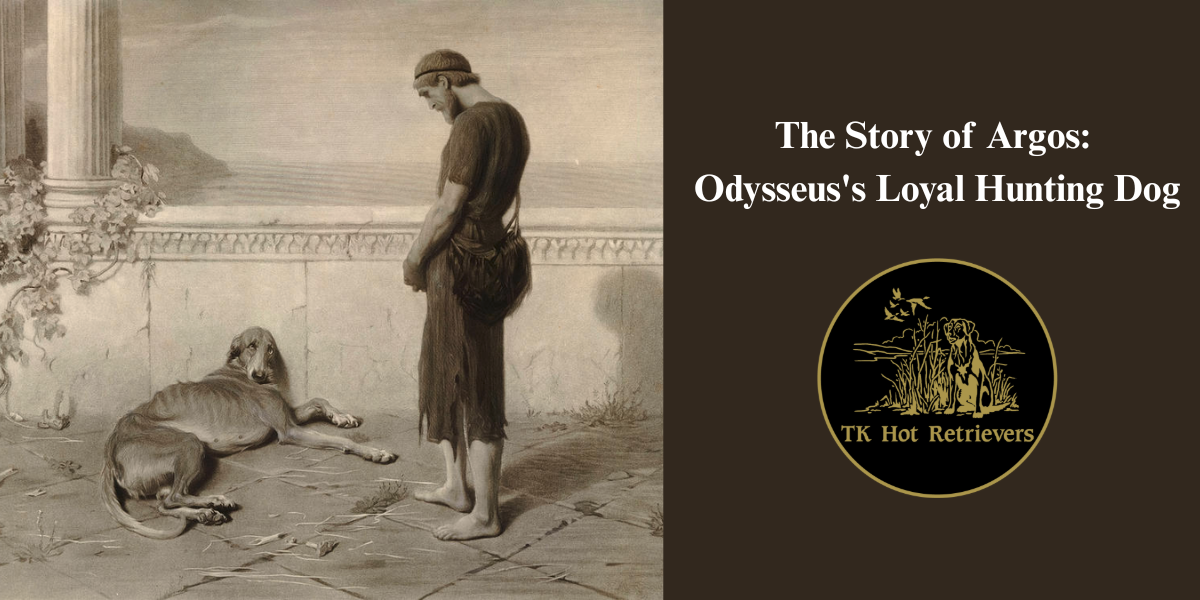The Story of Argos: Odysseus’s Loyal Hunting Dog

In a tale of gods and monsters, cunning men, and treacherous seas, there is one heart-wrenching moment that speaks to the timeless bond between a man and his dog. Homer’s Odyssey tells the story of Argos, Odysseus’s loyal hunting dog.
Raised to be a Hunting Dog
Argos was born in Ithaca during the final years of peace before the Trojan War. Odysseus himself raised Argos, breeding him to be a hunter with a keen nose and loyal heart. As a puppy, Argos gained renown throughout Ithaca for his hunting skills in any environment. But more than his skill, it was his loyalty that made him the best dog in town. Argos was Odysseus’s companion through and through, symbolizing his youth, strength, and kingdom. They stood together side by side, happily, until the war hit.
A Loyal Dog Even Through Years of War
After Helen of Sparta was taken and war swept through Greece, Odysseus tried to avoid the summons, but his fate was already sealed. He left for Troy with a heavy heart, knowing he may not return. Argos watched his master sail away, unsure how long the wait would be. Odysseus fought for ten long years at Troy and spent another ten wandering the sea, trapped by storms, monsters, and gods who conspired to delay his arrival. During these long years, Argos waited. And waited.
Over the years, the palace of Osysseus fell into despair. Servants grew complacent, and suitors barged in, all looking to wed Odysseus’s wife and take his throne. Betrayment came from all parts of the palace, except one.
Argos, the dog once celebrated for his speed and intelligence, was now old and broken. Abandoned by the palace, he found shelter in a heap of dung beside the gates. His once intensely trained body was wasted away, eyes cloudy, and fur matted. He could no longer run, hunt, or lift his head all the way. All he could do was remember his owner and wait. Every footstep that passed, every breeze that gave him a whiff of new scents, he would listen, sniff, and hope that one day one of those sounds or smells would be from Odysseus.
Loyal to the End
At last, after twenty years, Odysseus returned, but not in a recognizable form. Athena disguised him as a beggar with her magic, and he crept through the city to truly understand what had become of his home. No one recognized him, not his people or even his wife. But as he approached the palace gates, one pair of ears twitched and a nose sniffed. Argos used all the strength he had to lift his head to meet the eyes he had waited so long to see.
Despite the decades of pain and neglect, Argos recognized his master instantly. Odysseus saw him too, though he couldn’t break his cover. As he passed, tears welled in his eyes. In that moment, a lifetime of waiting was repaid. Argos fulfilled his final duty, to greet his master one last time. Then, at peace, he laid his head down. Quietly, he passed. He had held on just long enough to see the man he loved return home, and then, finally, he let go.
Argos only appears in a handful of lines, but his story endures as one of the most moving moments in all of ancient literature. Because in a world of gods and warriors, it is a dog who shows the deepest heart and loyalty. Argos is not just a dog from a myth. He is every loyal companion who sits by the door, who watches the horizon, who waits for us to come home. And in doing so, he becomes a hero in his own right—not through battles won, but through faith kept.
An Excerpt from the Odyssey
As they were thus talking, a dog that had been lying asleep raised his head and pricked up his ears. This was Argos, whom had bred before setting out for Troy, but he had never had any work out of him. In the old days he used to be taken out by the young men when they went hunting wild goats, or deer, or hares, but now that his master was gone he was lying neglected on the heaps of mule and cow dung that lay in front of the stable doors till the men should come and draw it away to manure the great close; and he was full of fleas. As soon as he saw Odysseus standing there, he dropped his ears and wagged his tail, but he could not get close up to his master. When Odysseus saw the dog on the other side of the yard, he dashed a tear from his eyes without Eumaeus seeing it, and said: “Eumaeus, what a noble hound that is over yonder on the manure heap: his build is splendid; is he as fine a fellow as he looks, or is he only one of those dogs that come begging about a table, and are kept merely for show?” “This hound,” answered Eumaeus, “belonged to him who has died in a far country. If he were what he was when Odysseus left for Troy, he would soon show you what he could do. There was not a wild beast in the forest that could get away from him when he was once on its tracks. But now he has fallen on evil times, for his master is dead and gone, and the women take no care of him. Servants never do their work when their master’s hand is no longer over them, for Jove takes half the goodness out of a man when he makes a slave of him.” As he spoke he went inside the buildings to the cloister where the suitors were, but Argos died as soon as he had recognised his master.